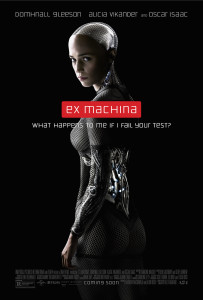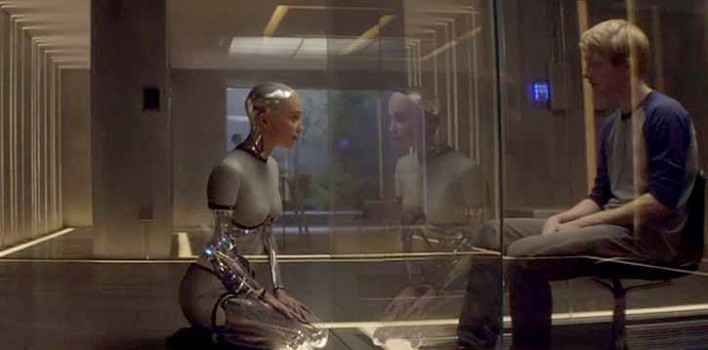Review| Ex Machina
 On the most recent episode of the Reel World Theology podcast, discussing Avengers: Age of Ultron, Mikey and I were musing about the slew of AI movies making their way into theaters. Movies already out this year addressing AI, like Avengers and Chappie, have dealt with different consequences, good and bad, of AI technology. The conversation surrounding strong AI and the multi-faceted moral complexity in the cinema is not a resounding gong, but a steady, growing clamor.
On the most recent episode of the Reel World Theology podcast, discussing Avengers: Age of Ultron, Mikey and I were musing about the slew of AI movies making their way into theaters. Movies already out this year addressing AI, like Avengers and Chappie, have dealt with different consequences, good and bad, of AI technology. The conversation surrounding strong AI and the multi-faceted moral complexity in the cinema is not a resounding gong, but a steady, growing clamor.
Alex Garland’s directorial debut, Ex Machina, takes the conversation deeper and to its origins. Treading a similar path to 2013’s The Machine, the movie does not deal with the societal and cultural consequences of AI technology. Quickly kicking off with Caleb (Domhnall Gleeson) winning a contest at his tech company, Bluebook (a combination of Google and Facebook), to spend a week with the founder of his company, Nathan (Oscar Isaac). When he arrives at his off-the-grid estate via helicopter, he assumes he is there to spend time, talk shop, and pick Nathan’s gifted brain. However, Nathan’s purpose in bringing Caleb to his house is not to commiserate and drink beer, but to be a part of something special. Nathan’s estate is not a home, but a research facility and Caleb has been brought there to test Nathan’s development of artificial intelligence (AI). Caleb meets Ava (Alicia Vikander), a female android programmed with Nathan’s AI research, and he is fascinated and even slightly smitten. Their fascination and testing give way to mistrust and unease as new revelations about the three’s intentions and ambitions become clear.
Dressing up the unease that embodies the movie’s mood is the hair-raising musical score from Ben Salisbury and Geoff Barrow. There is a suspicion that not all is well or right in Nathan’s research facility/home and a synthesizer-heavy score, utilizing ominous high register plinks and clamorous, teeming warbles, permeates throughout and does not allow the viewer to ease up.
 We do not find any relief in the three main characters, either. Isaac’s Nathan is neither a goofy nerd nor a malevolent bad guy, but has a frat bro, one-of-the-guys attitude making him simultaneously likable and suspect. Is it normal for a “dude-bro” to live in a reclusive estate in the mountains experimenting with AI in robotic female bodies? Issac’s performance makes us uncomfortable with his motives, and Vikander’s steely Ava does nothing to alleviate the tension being created. Yet, she is warm, inviting Caleb to know her better, showing genuine empathy, and appearing human in every facet. Caleb is intrigued, yet unsure how this AI could be every bit human yet in actuality be artificial.
We do not find any relief in the three main characters, either. Isaac’s Nathan is neither a goofy nerd nor a malevolent bad guy, but has a frat bro, one-of-the-guys attitude making him simultaneously likable and suspect. Is it normal for a “dude-bro” to live in a reclusive estate in the mountains experimenting with AI in robotic female bodies? Issac’s performance makes us uncomfortable with his motives, and Vikander’s steely Ava does nothing to alleviate the tension being created. Yet, she is warm, inviting Caleb to know her better, showing genuine empathy, and appearing human in every facet. Caleb is intrigued, yet unsure how this AI could be every bit human yet in actuality be artificial.
The juxtaposition of the technological and the natural is a main cinematic motif informing the narrative of Garland’s story. The sterile, ordered and windowless environment of the research lab is like a 21st century Garden of Eden among the purity of God’s realm of nature. Every new day in Nathan’s home commences with sun-bathed shots of rocks, rivers, ice; it’s God’s creation. Inside man’s realm, fluorescent lights and carved stone, where, in Nathan’s implicit words, Ava has been created in man’s image. Creation of AI is not man’s history, as created beings, but is the history of gods, as the creators of life.
But is it really life? Is it, as Nathan muses, an inevitability in man’s evolution? And if this AI is life, is it ethical and moral to manipulate and control that life? As the movie unfolds into the final third, we’re left to ponder the moral quandary of humanity and technology.
As a Christian, I see the movie recognizes the incredible moral complexity of creating AI while also wrestling with the human desire to both nurture and control what is created. Inevitably, AI is something man creates and runs the risk of falling into idolatry and the exchange of God’s glory for images resembling ourselves, to loosely quote Paul in Romans 1. By proxy, we dethrone the King of the Universe to make ourselves the ruler of this new creation and desire control over it. On multiple levels, Ex Machina is deconstructing man’s desire to rule over what God has given them to steward. The consequences of which are imprisoning and deadly.







